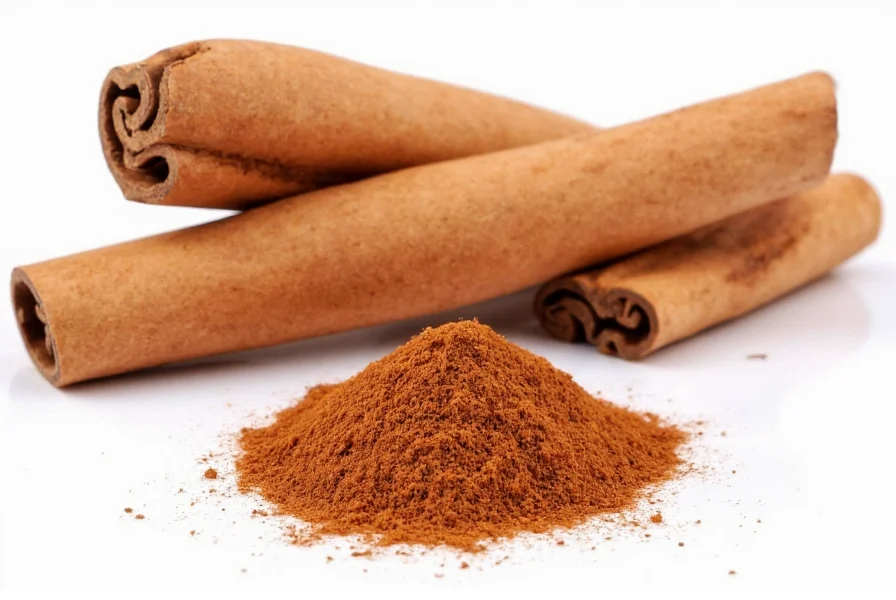When navigating dietary choices during pregnancy, many expectant mothers wonder about the safety of common spices like cinnamon. This comprehensive guide examines current medical understanding of cinnamon consumption during pregnancy, separating evidence-based facts from common misconceptions. As pregnancy creates unique nutritional needs and sensitivities, understanding which foods and spices are safe becomes critically important for maternal and fetal health.
Understanding Cinnamon: Types and Composition
Cinnamon isn't a single uniform spice but comes in several varieties, each with different chemical profiles that affect pregnancy safety considerations. The two primary types you'll encounter are:
| Type of Cinnamon | Coumarin Content | Common Uses | Pregnancy Recommendation |
|---|---|---|---|
| Ceylon Cinnamon ("True" Cinnamon) | Very low (0.017g per 100g) | Gourmet cooking, specialty products | Safer option; moderate culinary use acceptable |
| Cassia Cinnamon (Most common in US) | High (6.97g per 100g) | Supermarket products, baked goods | Limited use; avoid daily consumption |
The key difference lies in coumarin content—a natural compound that in high doses may affect liver function and potentially impact pregnancy. Cassia cinnamon contains significantly higher levels of coumarin compared to Ceylon cinnamon, making the latter the preferred choice for pregnant women concerned about cinnamon consumption during pregnancy.

Potential Benefits of Cinnamon During Pregnancy
While research specifically on cinnamon and pregnancy remains limited, some potential benefits have been identified through general nutritional studies:
Blood sugar regulation: Several studies suggest cinnamon may help improve insulin sensitivity, which is particularly relevant for women managing gestational diabetes. A 2020 review in the Nutrition Journal noted that cinnamon supplementation showed modest improvements in fasting blood glucose levels, though the researchers emphasized that dietary changes and medical supervision remain primary approaches for gestational diabetes management.
Antioxidant properties: Cinnamon ranks among the highest spices for antioxidant content, which may support overall health during pregnancy. These compounds help combat oxidative stress, though direct pregnancy-specific benefits require more research.
It's crucial to understand that while these potential benefits exist, they don't constitute medical recommendations for cinnamon use during pregnancy. The evidence supporting significant therapeutic effects at safe consumption levels remains limited.
Safety Considerations and Potential Risks
When evaluating cinnamon safety in pregnancy, several important factors require consideration:
Coumarin concerns: The European Food Safety Authority recommends a maximum daily coumarin intake of 0.1mg per kilogram of body weight. For a 130-pound pregnant woman, this translates to approximately 1 teaspoon of Cassia cinnamon or several teaspoons of Ceylon cinnamon. Regular consumption of Cassia cinnamon at higher amounts could potentially exceed safe limits.
Uterine stimulation: Traditional medicine sometimes uses cinnamon for its potential emmenagogue effects (stimulating menstrual flow). While culinary amounts are unlikely to cause issues, concentrated forms like supplements or essential oils might theoretically increase uterine activity, making them inadvisable during pregnancy without medical supervision.
Medication interactions: Cinnamon may interact with certain medications, particularly those affecting blood sugar or blood thinning. Pregnant women taking such medications should consult their healthcare provider before increasing cinnamon consumption.
Cinnamon and Gestational Diabetes: What Research Says
One of the most common reasons pregnant women inquire about cinnamon consumption during pregnancy relates to blood sugar management. Let's examine what current research indicates:
A 2022 systematic review published in Diabetes Research and Clinical Practice analyzed multiple studies on cinnamon and blood glucose control. The review concluded that while cinnamon showed modest improvements in fasting blood glucose (approximately 10-15 mg/dL reduction), the effects were inconsistent across studies and generally not sufficient as a standalone treatment for gestational diabetes.
Most healthcare providers emphasize that dietary approaches to managing gestational diabetes should focus primarily on balanced macronutrient intake, portion control, and regular physical activity, with cinnamon playing at most a minor supplementary role. Women with gestational diabetes should never replace prescribed treatments with cinnamon supplementation.
Practical Recommendations for Expectant Mothers
Based on current medical understanding, here are evidence-based recommendations for cinnamon use during pregnancy:
- Choose Ceylon over Cassia: When possible, select Ceylon cinnamon for cooking and baking during pregnancy
- Moderation is key: Limit to no more than ½-1 teaspoon of Ceylon cinnamon daily
- Avoid supplements: Cinnamon capsules, extracts, and essential oils should be avoided without explicit medical approval
- Check product labels: Many commercial products don't specify cinnamon type—when in doubt, assume it's Cassia
- Monitor your body: Discontinue use if you experience any unusual symptoms
These guidelines for cinnamon consumption in pregnancy align with recommendations from major obstetric organizations, though specific limits may vary slightly between institutions. The American College of Obstetricians and Gynecologists (ACOG) generally supports moderate culinary use of common spices while cautioning against therapeutic doses without medical supervision.

When to Consult Your Healthcare Provider
Certain situations warrant specific discussion with your prenatal care provider regarding cinnamon and pregnancy:
- If you have gestational diabetes or pre-existing diabetes
- If you're taking medications that affect blood sugar or blood clotting
- If you have liver conditions or concerns
- If you're considering cinnamon supplements rather than culinary use
- If you experience any unusual symptoms after consuming cinnamon
Your healthcare provider can offer personalized guidance based on your specific health profile and pregnancy progression. They may recommend specific limits for cinnamon tea during pregnancy safety or address concerns about cinnamon and early pregnancy.
Conclusion: Making Informed Choices
Navigating dietary choices during pregnancy requires balancing potential benefits against possible risks. For cinnamon specifically, the evidence suggests that moderate culinary use of Ceylon cinnamon presents minimal risk for most pregnant women, while Cassia cinnamon should be consumed more sparingly due to its higher coumarin content.
As with any dietary consideration during pregnancy, individual factors matter significantly. What's appropriate for one expectant mother might not be suitable for another, particularly when managing specific health conditions. Always prioritize evidence-based information from reliable medical sources when making decisions about cinnamon consumption in pregnancy.
Frequently Asked Questions
Can cinnamon cause miscarriage in early pregnancy?
No, culinary amounts of cinnamon (½-1 teaspoon of Ceylon cinnamon daily) do not cause miscarriage. While extremely high doses of cinnamon supplements might theoretically stimulate uterine activity, normal food use presents no such risk. The concern about cinnamon and early pregnancy miscarriage relates to concentrated forms, not typical culinary use.
Is cinnamon tea safe during pregnancy?
Yes, one cup of cinnamon tea made with Ceylon cinnamon is generally considered safe during pregnancy. However, daily consumption of multiple cups, especially if made with Cassia cinnamon, could potentially exceed recommended coumarin limits. Pregnant women should limit cinnamon tea to one cup daily and choose Ceylon cinnamon when possible for optimal cinnamon tea during pregnancy safety.
How much cinnamon is safe while pregnant?
Most healthcare providers recommend no more than ½-1 teaspoon (approximately 1 gram) of Ceylon cinnamon per day during pregnancy. For Cassia cinnamon, limit to ½ teaspoon or less daily due to higher coumarin content. These amounts represent culinary use in foods and beverages, not supplements. Exceeding these limits regularly may pose risks, particularly with Cassia cinnamon and pregnancy.
Can I use cinnamon for gestational diabetes management?
While some studies show cinnamon may have modest benefits for blood sugar control, it should never replace standard treatments for gestational diabetes. If you have gestational diabetes, focus on medically approved approaches including diet, exercise, and medication as prescribed. Cinnamon might serve as a minor supplementary element in your diet, but discuss any specific cinnamon and gestational diabetes pregnancy strategies with your healthcare provider first.
What's the difference between Ceylon and Cassia cinnamon during pregnancy?
Ceylon cinnamon ("true" cinnamon) contains significantly less coumarin than Cassia cinnamon, making it the safer choice during pregnancy. Ceylon has a lighter, sweeter flavor and comes in thin, layered sticks, while Cassia is thicker, harder, and more common in supermarkets. For pregnancy safety, choose Ceylon when possible and limit Cassia to occasional use in small amounts for optimal cinnamon consumption in pregnancy.











 浙公网安备
33010002000092号
浙公网安备
33010002000092号 浙B2-20120091-4
浙B2-20120091-4